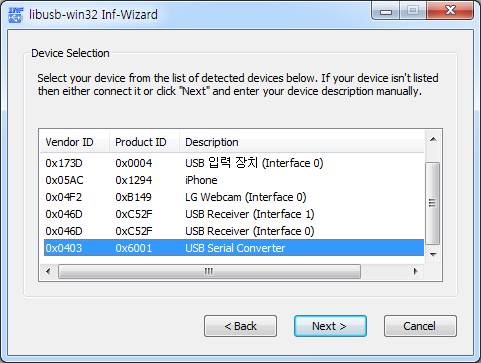
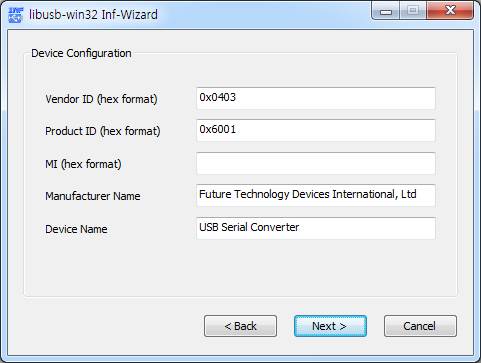
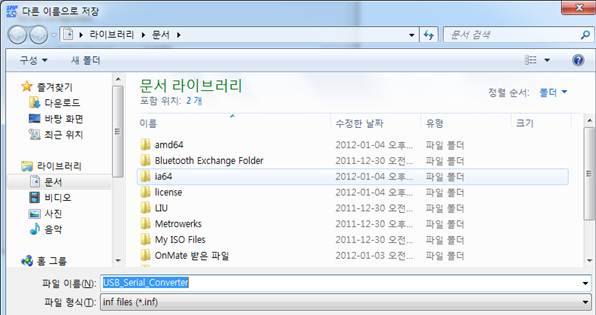
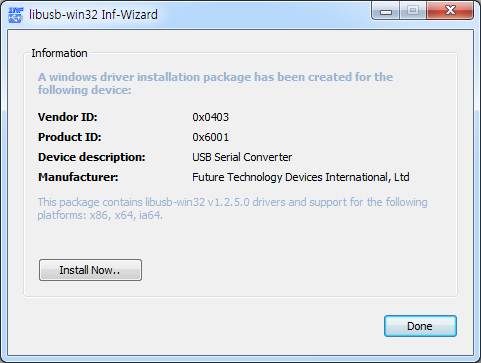
#include#include // Enables this example to work with a device running the // libusb-win32 PIC Benchmark Firmware. #define BENCHMARK_DEVICE ////////////////////////////////////////////////////////////////////////////// // TEST SETUP (User configurable) // Issues a Set configuration request #define TEST_SET_CONFIGURATION // Issues a claim interface request #define TEST_CLAIM_INTERFACE // Use the libusb-win32 async transfer functions. see // transfer_bulk_async() below. #define TEST_ASYNC // Attempts one bulk read. #define TEST_BULK_READ // Attempts one bulk write. // #define TEST_BULK_WRITE ////////////////////////////////////////////////////////////////////////////// // DEVICE SETUP (User configurable) // Device vendor and product id. #define MY_VID 0x0666 #define MY_PID 0x0001 // Device configuration and interface id. #define MY_CONFIG 1 #define MY_INTF 0 // Device endpoint(s) #define EP_IN 0x81 #define EP_OUT 0x01 // Device of bytes to transfer. #define BUF_SIZE 64 ////////////////////////////////////////////////////////////////////////////// usb_dev_handle *open_dev(void); static int transfer_bulk_async(usb_dev_handle *dev, int ep, char *bytes, int size, int timeout); usb_dev_handle *open_dev(void) { struct usb_bus *bus; struct usb_device *dev; for (bus = usb_get_busses(); bus; bus = bus->next) { for (dev = bus->devices; dev; dev = dev->next) { if (dev->descriptor.idVendor == MY_VID && dev->descriptor.idProduct == MY_PID) { return usb_open(dev); } } } return NULL; } int main(void) { usb_dev_handle *dev = NULL; /* the device handle */ char tmp[BUF_SIZE]; int ret; void* async_read_context = NULL; void* async_write_context = NULL; usb_init(); /* initialize the library */ usb_find_busses(); /* find all busses */ usb_find_devices(); /* find all connected devices */ if (!(dev = open_dev())) { printf("error opening device: %s ", usb_strerror()); return 0; } else { printf("success: device %04X:%04X opened ", MY_VID, MY_PID); } #ifdef TEST_SET_CONFIGURATION if (usb_set_configuration(dev, MY_CONFIG) < 0) { printf("error setting config #%d: %s ", MY_CONFIG, usb_strerror()); usb_close(dev); return 0; } else { printf("success: set configuration #%d ", MY_CONFIG); } #endif #ifdef TEST_CLAIM_INTERFACE if (usb_claim_interface(dev, 0) < 0) { printf("error claiming interface #%d: %s ", MY_INTF, usb_strerror()); usb_close(dev); return 0; } else { printf("success: claim_interface #%d ", MY_INTF); } #endif #ifdef TEST_BULK_WRITE #ifdef BENCHMARK_DEVICE ret = usb_control_msg(dev, USB_TYPE_VENDOR | USB_RECIP_DEVICE | USB_ENDPOINT_IN, 14, /* set/get test */ 2, /* test type */ MY_INTF, /* interface id */ tmp, 1, 1000); #endif #ifdef TEST_ASYNC // Running an async write test ret = transfer_bulk_async(dev, EP_OUT, tmp, sizeof(tmp), 5000); #else // Running a sync write test ret = usb_bulk_write(dev, EP_OUT, tmp, sizeof(tmp), 5000); #endif if (ret < 0) { printf("error writing: %s ", usb_strerror()); } else { printf("success: bulk write %d bytes ", ret); } #endif #ifdef TEST_BULK_READ #ifdef BENCHMARK_DEVICE ret = usb_control_msg(dev, USB_TYPE_VENDOR | USB_RECIP_DEVICE | USB_ENDPOINT_IN, 14, /* set/get test */ 1, /* test type */ MY_INTF, /* interface id */ tmp, 1, 1000); #endif #ifdef TEST_ASYNC // Running an async read test ret = transfer_bulk_async(dev, EP_IN, tmp, sizeof(tmp), 5000); #else // Running a sync read test ret = usb_bulk_read(dev, EP_IN, tmp, sizeof(tmp), 5000); #endif if (ret < 0) { printf("error reading: %s ", usb_strerror()); } else { printf("success: bulk read %d bytes ", ret); } #endif #ifdef TEST_CLAIM_INTERFACE usb_release_interface(dev, 0); #endif if (dev) { usb_close(dev); } printf("Done. "); return 0; } /* * Read/Write using async transfer functions. * * NOTE: This function waits for the transfer to complete essentially making * it a sync transfer function so it only serves as an example of how one might * implement async transfers into thier own code. */ static int transfer_bulk_async(usb_dev_handle *dev, int ep, char *bytes, int size, int timeout) { // Each async transfer requires it"s own context. A transfer // context can be re-used. When no longer needed they must be // freed with usb_free_async(). // void* async_context = NULL; int ret; // Setup the async transfer. This only needs to be done once // for multiple submit/reaps. (more below) // ret = usb_bulk_setup_async(dev, &async_context, ep); if (ret < 0) { printf("error usb_bulk_setup_async: %s ", usb_strerror()); goto Done; } // Submit this transfer. This function returns immediately and the // transfer is on it"s way to the device. // ret = usb_submit_async(async_context, bytes, size); if (ret < 0) { printf("error usb_submit_async: %s ", usb_strerror()); usb_free_async(&async_context); goto Done; } // Wait for the transfer to complete. If it doesn"t complete in the // specified time it is cancelled. see also usb_reap_async_nocancel(). // ret = usb_reap_async(async_context, timeout); // Free the context. usb_free_async(&async_context); Done: return ret; }
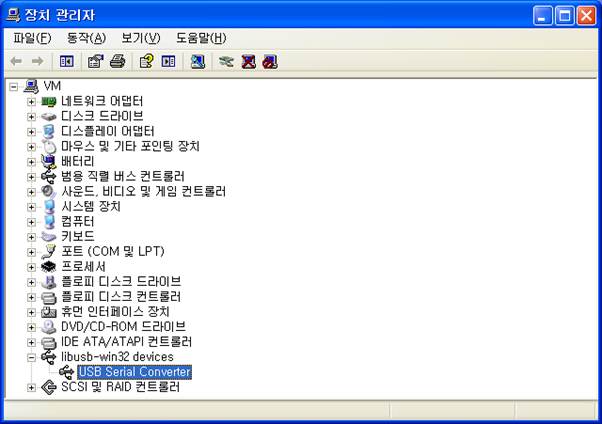
이전 글 : 기업을 위한 오픈 소스 커뮤니티 협업 전략
다음 글 : 빅 데이터와 시민권에 대하여
최신 콘텐츠